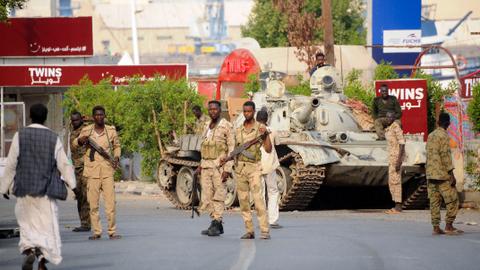Global Courant 2023-04-21 02:36:14
Sudan’s chief of staff, Abdel Fattah al Burhan, said there was “no room” for negotiations as clashes with his rival paramilitary commander Mohamed Hamdan Daglo and the death toll exceeded 330.
The clashes took a heavy toll on civilians, as UN children’s agency UNICEF said “at least nine children have been reported killed”. (AFP)
The struggle between the two rival generals showed no signs of easing ahead of festivities marking the end of the Islamic holy month of Ramadan, while Sudan’s chief of staff refused to meet with his rival but said he was open to mediation.
General Abdel Fattah al Burhan, Chief of Staff of Sudan, received separate calls on Thursday from Turkish President Erdogan, the Saudi and Qatari foreign ministers, the Egyptian intelligence chief and the United States calling for a temporary ceasefire.
The calls came amid efforts by both the military and paramilitary Rapid Support Forces (RSF) to agree on a three-day ceasefire during the Eid al-Fitr, which began on Friday, when explosions and gunfire echoed in Sudan’s capital for the sixth consecutive night.
All parties, including calls from the UN secretary general and the leaders of South Sudan and Ethiopia, reaffirmed the need to stop violence and engage in dialogue.
More than 300 people have been killed since clashes broke out on Saturday between forces loyal to the Sudanese chief of staff and his deputy, Mohamed Hamdan Daglo, who commands the paramilitary RSF.
Some of the most violent clashes took place in the capital, Khartoum, a city of five million people, most of whom live in their homes without electricity, food or water.
As the conflicts escalated, Burhan dismissed any possibility of negotiation with Daglo and said: Al Jazeera TV said it saw no other option but “decisive military” action.
“I don’t think there is room for renegotiation of politics with the Emergency Support Forces,” he told the Qatar-based broadcaster, adding that he is open to mediation.
Armed clashes continued into Thursday night as columns of black smoke rose from buildings around Khartoum International Airport and army headquarters after two ceasefires failed to be reached in two days.
Eyewitnesses reported loud explosions beyond Khartoum in the city of Obeid in the central North Kordofan province.
Ahmed al Mandhari of the World Health Organization said on Thursday that “almost 330 people were killed and about 3,200 more” were injured in Khartoum, the western Darfur region and other states.
The roots of the conflict
The clashes took a heavy toll on civilians, as UN children’s agency UNICEF said “at least nine children have been reported killed”.
The World Food Program (WFP) has warned that violence could lead millions more to starvation in a country where 15 million people – a third of the population – already face food insecurity.
Sudan suspended operations after three WFP employees were killed on Saturday.
Burhan and Daglo’s bitter dispute centered around the planned integration of the RSF into the regular army, a key condition for a final agreement aimed at restoring Sudan’s democratic transition.
Both generals jointly overthrew long-time ruler Omar al-Bashir in April 2019, after mass protests against thirty years of iron-fisted rule.
In October 2021, they derailed the transition to internationally supported democracy by working together again to overthrow the civilian government established after Bashir’s overthrow.
Burhan, whose career progressed under Bashir, argued that his coup was “necessary” to bring more factions into politics.
But Daglo, who came to the fore during Bashir’s operation against Darfur rebels, has since described the coup as a “mistake” that has failed to bring about change and has instead revived Bashir’s stubbornness.
Source: TRTWorld and its agencies








